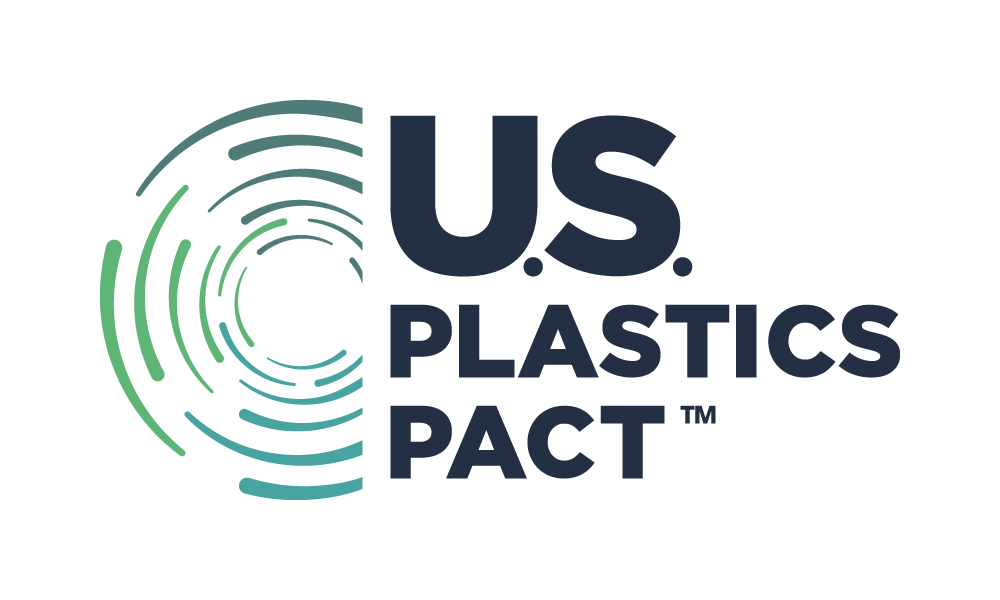Walpole, NH, (February 21, 2023) – Today, the U.S. Plastics Pact released its Annual Report, publishing aggregated data from its member organizations (“Activators”) in 2021.
The U.S. Pact’s consumer packaged goods, retailer, and converter Activators produce 37% of plastic packaging in scope in the U.S. by weight, placing 5.9M tons of plastic packaging on the market. Since its launch in August 2020 the U.S. Pact has doubled membership, interest, and impact with more than 120 businesses, not-for-profit organizations, government agencies, and research institutions addressing four targets to address plastic waste at its source by 2025.
- TARGET 1 – Define a list of packaging that is problematic or unnecessary by 2021 & take measures to eliminate items on the list by 2025
- TARGET 2 – 100% of plastic packaging will be reusable, recyclable, or compostable by 2025
- TARGET 3 – Undertake ambitious actions to effectively recycle or compost 50% of plastic packaging by 2025
- TARGET 4 – Achieve an average of 30% recycled content or responsibly sourced biobased content in plastic packaging by 2025
Progress since the Baseline Report includes:
- creation of the Target 1 Problematic and Unnecessary Materials List with 86% of plastic packaging placed on the market by U.S. Pact Activators by weight not containing items on the list;
- improved design of recyclable, reusable, refillable, and compostable plastic packaging with recognition of top performers through the Sustainable Packaging Innovation Award;
- continued increases in the use of postconsumer recycled content (PCR) in plastic packaging with an 8% average PCR or responsibly sourced biobased content used by U.S. Pact Activators;
- improved technologies and increased use of technology to make the recycling process more efficient; and
- support of innovative and reusable product delivery models including the launch of the U.S. Pact Reuse Catalyst with 20 Partners selected for the inaugural cohort.
Activators will continue to assess their portfolios and report progress toward the four targets annually through World Wildlife Fund’s Resource Footprint Tracker. Progress toward elimination also will be documented in aggregate as part of future U.S. Pact’s annual reports.
“The U.S. Pact is bringing forward never-before-seen plastics data and challenging companies operating under difficult market conditions to reduce waste,” said Emily Tipaldo, Executive Director, U.S. Pact. “We must continue to rally Activators around our common language and definitions, gathering novel data to model the future potential, and, finally, supporting and inspiring companies to move toward our circular economy vision. Conceding on 2025 commitments will not foster the support still needed to shake the plastics packaging value chain out of the status quo. We must continue to push the boundaries of collaboration and transparency to build the circular economy for plastics packaging.”
“To advance towards zero waste, Seattle supports and promotes policies and practices that create a circular economy and reduce Seattle’s waste and carbon pollution as rapidly as possible. The U.S. Plastics Pact is playing a critical role in bringing those with a vested interest to the table to make commitments and work out actionable solutions to reduce plastic waste and ensure that the plastics in our consumption stream are captured and actually reused, repurposed, or recycled.” – Susan Fife-Ferris, Solid Waste Planning & Program Management Director, Seattle Public Utilities.”
“The U.S. Plastics Pact is creating a defined, measurable pathway to packaging sustainability by setting design standards to ensure packaging is recyclable, and placing a stake in the ground regarding materials that are problematic and unnecessary. Publicly reporting brand companies’ progress toward their stated sustainability goals ensures continued accountability for circularity. The U.S. Pact is a true leader creating a more sustainable packaging footprint.” – Steve Alexander, President and Chief Executive Officer, The Association of Plastic Recyclers (APR)
“We are delighted with the active engagement of so many stakeholders to quickly make important changes, such as finalizing the U.S. Pact’s Problematic and Unnecessary Materials List. We are particularly pleased to have agreed on eliminating PFAS, polystyrene, and polyvinyl chloride by 2025 which, will reduce waste and pollution at the source and make it easier, safer, and more cost-effective to recycle plastics.” – Heidi Sanborn, Founding Director, National Stewardship Action Council (NSAC)
“Stakeholder collaboration is key to enabling a circular economy for plastics. Danone North America is proud to participate with other forward-thinking U.S. Plastics Pact Activator organizations working towards systemic change through aggressive targets.” – Marcu Alexander, Manager, Packaging Sustainability, Danone North America
Media Inquiries:
To arrange an interview with Emily Tipaldo, Executive Director, U.S. Pact, or to connect with U.S. Pact Activators, contact: Tiana Lightfoot Svendsen, tsvendsen@usplasticspact.org
214-235-5351




